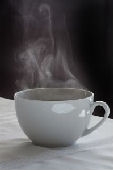
Purpose
To examine what happens to various liquids when they've been left in the sun for extended periods of time.
Additional information
If you've ever left boiling water on the stove for too long, you're sure to have noticed that you have less water in the pot then when you started. What happens to the water? Evaporation!
Evaporation is the slow process of vaporization of liquid. When the molecules in their liquid state are heated, they become gaseous. The rate of evaporation is dependant upon temperature, humidity, and wind speed. The higher the temperature is the quicker the rate of evaporation. In areas of low humidity, evaporation occurs at a more rapid pace. Finally, the higher the speed of wind the quick the evaporation process will be.
Sponsored Links
Required materials
- 4 bowls of equal size
- Plain water
- Salty water
- Vinegar
- Rubbing alcohol
- Plastic ruler
- Windowsill or a spot that gets lots of sun
- Pen or pencil
- Journal to record results
Estimated Experiment Time
Several days
Step-By-Step Procedure
- 1. Pour the same amount of each liquid into separate bowls (about one cup). You'll have one bowl of water, one bowl of salty water, one bowl of vinegar, and one bowl of rubbing alcohol.
- 2. Place all four bowls in a sunny spot. This can be on a windowsill where a lot of natural sunshine comes in or a spot outside that receives a lot of sun. Place the ruler in the bowls and note the depth. Write the measurements in your journal.
- 3. After about two hours check the depth of each bowl again. Write the measurements in your journal.
- 4. Measure the depth of the liquids every three hours, writing the measurements down in your journal each time. You'll notice that the liquids will be evaporating with each measurement.
- 5. After a few days what is left in the bowls? Write the results in your journal.
Note
You can use methylated spirits in place of the rubbing alcohol. Note that if you use methylated spirits, make sure to have permission and supervision from an adult. Methylated spirits are not the kind you drink. They can be poisonous and cause severe harm if swallowed.
Observation
What happens with each check of the liquid levels? Which liquid appears to be evaporating at the quickest pace? What other liquids could you use in this experiment? Which would you think would evaporate the quickest? What if you were to use juice or soda?
Result
Liquids evaporate, or turn to gas, when they are heated up. After a few days in the warm sun, the liquid in your bowls will have evaporated. You should have noticed that the rate of evaporation varied with each liquid, with the methylated spirits evaporating at the quickest pace. What did you observe in the bowls when the liquids had all evaporated? You'll note that the salt from the salted-water is left behind in the bowl. This is because the salt dissolved in the water but cannot evaporate.
Sponsored Links
Take a moment to visit our table of Periodic Elements page where you can get an in-depth view of all the elements,
complete with the industry first side-by-side element comparisons!